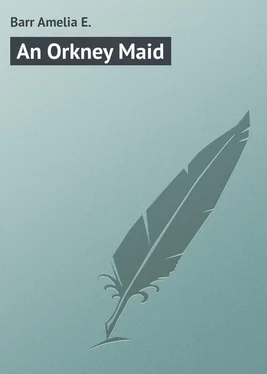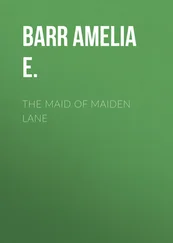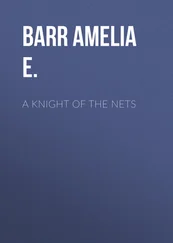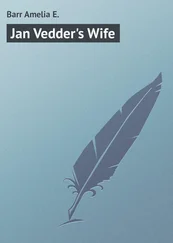Amelia Barr - An Orkney Maid
Здесь есть возможность читать онлайн «Amelia Barr - An Orkney Maid» — ознакомительный отрывок электронной книги совершенно бесплатно, а после прочтения отрывка купить полную версию. В некоторых случаях можно слушать аудио, скачать через торрент в формате fb2 и присутствует краткое содержание. Жанр: foreign_prose, на английском языке. Описание произведения, (предисловие) а так же отзывы посетителей доступны на портале библиотеки ЛибКат.
- Название:An Orkney Maid
- Автор:
- Жанр:
- Год:неизвестен
- ISBN:нет данных
- Рейтинг книги:5 / 5. Голосов: 1
-
Избранное:Добавить в избранное
- Отзывы:
-
Ваша оценка:
- 100
- 1
- 2
- 3
- 4
- 5
An Orkney Maid: краткое содержание, описание и аннотация
Предлагаем к чтению аннотацию, описание, краткое содержание или предисловие (зависит от того, что написал сам автор книги «An Orkney Maid»). Если вы не нашли необходимую информацию о книге — напишите в комментариях, мы постараемся отыскать её.
An Orkney Maid — читать онлайн ознакомительный отрывок
Ниже представлен текст книги, разбитый по страницам. Система сохранения места последней прочитанной страницы, позволяет с удобством читать онлайн бесплатно книгу «An Orkney Maid», без необходимости каждый раз заново искать на чём Вы остановились. Поставьте закладку, и сможете в любой момент перейти на страницу, на которой закончили чтение.
Интервал:
Закладка:
Barr Amelia E.
An Orkney Maid
“You can glad your child, or grieve it,
You can help it, or deceive it,
When all is done,
Beneath God’s sun,
You can only love, and leave it.”
INTRODUCTION
Yesterday morning this thing happened to me: I was reading the New York Times and my eyes suddenly fell upon one word, and that word rang a little bell in my memory, “Kirkwall!” The next moment I had closed my eyes in order to see backward more clearly, and slowly, but surely, the old, old town–standing boldly upon the very beach of the stormy North Sea–became clear in my mental vision. There was a whole fleet of fishing boats, and a few smart smuggling craft rocking gently in its wonderful harbour–a harbour so deep and safe, and so capacious that it appeared capable of sheltering the navies of the world.
I was then eighteen years old, I am now over eighty-six; and the straits of Time have widened and widened with every year, so that many things appear to have been carried away into forgetfulness by the stress and flow of full waters. But not so! They are only lying in out-of-the-way corners of consciousness, and can easily be recalled by some word that has the potency of a spell over them.
“Kirkwall!” I said softly, and then I began to read what the Times had to say about Kirkwall. The great point appeared to be that as a rendezvous for ships it had been placed fifty miles within the “made in Germany” danger zone, and was therefore useless to the British men-of-war. And I laughed inwardly a little, and began to consider if Kirkwall had ever been long outside of some danger zone or other.
All its myths and traditions are of the fighting Picts and Scots, and when history began to notice the existence of the Orkneys it was to chronicle the struggle between Harold, King of Norway, and his rebellious subjects who had fled to the Orkneys to escape his tyrannical control. And of the danger zones of every kind which followed–of storm and battle and bloody death–does not the Saga of Eglis give us a full account?
This fight for popular freedom was a failure. King Harold conquered his rebellious subjects, and incidentally took possession of the islands and the people who had sheltered them. Then their rulers became Norwegian jarls–or earls–and there is no question about the danger zones into which the Norwegian vikings carried the Orcadeans–quite in accord with their own desire and liking, no doubt. And the stirring story of these years–full of delightful dangers to the men who adventured them–may all be read today in the blood-stirring, blood-curdling Norwegian Sagas.
In the middle of the fifteenth century, James the Third, King of Scotland, married Margaret of Denmark, and the Orcades were given to Scotland as a security for her dowry. The dowry was never paid, and after a lapse of a century and a half Denmark resigned all her Orcadean rights to Scotland. The later union of England and Scotland finally settled their destiny.
But until the last century England cared very little about the Orcades. Indeed Colonel Balfour, writing of these islands in A. D. 1861, says: “Orkney is a part of a British County, but probably there is no part of Europe which so few Englishmen visit.” Colonel Balfour, of Balfour and Trenabie, possessed a noble estate on the little isle of Shapinsay. He enthused the Orcadeans with the modern spirit of improvement and progress; he introduced a proper system of agriculture, built mills of all kinds, got laws passed for reclaiming waste lands, and was in every respect a wise, generous, faithful father of his country. To Americans Shapinsay has a peculiar interest. In a little cottage there, called Quholme , the father and mother of Washington Irving lived, and their son Washington was born on board an American ship on its passage from Kirkwall to New York.
However, it is only since A. D. 1830, one year before I was born, that the old Norse life has been changed in Orkney. Up to that date agriculture could hardly be said to exist. The sheep and cattle of all towns, or communities, grazed together; but this plan, though it saved the labour of herding, was at the cost of abandoning the lambs to the eagles who circled over the flocks and selected their victims at will. In the late autumn all stock was brought to the “infield,” which was then crowded with horses, cattle and sheep. In A. D. 1830, the Norwegian system of weights was changed to the standard weights and measures, and money, instead of barter, began to be used generally.
Then a great Scotch emigration set in, and brought careful methods of farming with it; and the Orcadean could not but notice results. The Scotch trader came also, and the slipshod Norse way of barter and bargaining had no chance with the Scotch steady prices and ready money. But even through all these domestic and civic changes Orkney was constantly in zones of danger. In the first half of the nineteenth century England was at war with France and Spain and Russia, and the Orcadeans have a fine inherited taste for a sea fight. The Vikings did not rule them through centuries for nothing: the Orcadean and his brother, the Shetlander, salt the British Navy, and they rather enjoy danger zones.
A single generation, with the help of steam communications, changed Orkney entirely and in the course of the second generation the Orcadean became eager for improvements of all kinds, and ready to forward them generously with the careful hoardings of perhaps many generations. And as it is in this transient period of the last century that my hero and heroine lived, I have thought it well to say something of antecedents that Americans may well be excused for knowing nothing about. Also–
… the past will always win
A glory from its being far;
And orb into the perfect star,
We saw not, when we walked therein.
However, Orkney was far from being out of danger zones in the nineteenth century. In its first quarter French and Dutch privateers made frequent raids on the islands; and the second quarter gave her men their chance of danger in the Crimea. They were not strangers in the Russian Chersoneus; their fathers had been in southern seas centuries before them. During the last fifty years they have made danger zones of their own free will, quarreling with coast guards, tampering with smugglers, wandering off with would-be discoverers of the North Pole, or with any other doubtful and dangerous enterprise.
And these reflections made me quite comfortable about the “made-in-Germany” danger zone. I think the Orcadeans will rather enjoy it; and I am quite sure if any Germans take to trafficking, or buying or selling, in Kirkwall, they will get the worst of it. In this direction it is rather pleasant to remember that even Scotchmen, disputing about money, will find the Orcadeans “too far north for them.”
CHAPTER I
THE HOUSE OF RAGNOR
Kind were the voices I used to hear
Round such a fireside,
Speaking the mother tongue old and dear;
Making the heart beat,
With endless tales of wonder and fear,
Or plaintive singing.
Great were the marvellous stories told
Of Ossian heroes,
Giants, and witches and young men bold
Seeking adventures,
Winning Kings’ daughters, and guarded gold
Only with valor.
The House of Ragnor was a large and very picturesque edifice. It was built of red and white sandstone which Time had covered with a heathery lichen, softening the whole into a shade of greenish grey. Many minds and many hands had fashioned it, for above its central door was the date, 1688, which would presuppose that it had been built from revenues coming as a reward for opposition to the Stuarts. It had been altered and enlarged by nearly every occupant, was many-roomed, and surrounded by a large garden, full of such small fruits as could ripen in the short summers, and of such flowers and shrubs as could live through the long winters. In sheltered situations, there were even hardy roses, and a royal plenty of England’s spring flowers sweetened many months of the year. A homely garden, where berries and roses grew together and privet hedges sheltered peas and lettuce, and tulips and wall-flowers did not disdain the proximity of household vegetables.
Читать дальшеИнтервал:
Закладка:
Похожие книги на «An Orkney Maid»
Представляем Вашему вниманию похожие книги на «An Orkney Maid» списком для выбора. Мы отобрали схожую по названию и смыслу литературу в надежде предоставить читателям больше вариантов отыскать новые, интересные, ещё непрочитанные произведения.
Обсуждение, отзывы о книге «An Orkney Maid» и просто собственные мнения читателей. Оставьте ваши комментарии, напишите, что Вы думаете о произведении, его смысле или главных героях. Укажите что конкретно понравилось, а что нет, и почему Вы так считаете.












